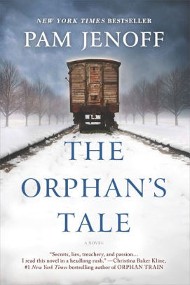|
Q&A
with Pam Jenoff
Author of The Orphan’s Tale
 |
Pam Jenoff
writes riveting and compelling novels about characters that
lived through World War II either rising to the occasion with
acts of courage or bravery or putting their own needs ahead
of humanity.
The Orphan’s
Tale, her latest tale, is a story of friendship set
in a traveling circus during World War II. It highlights two
vastly different women, a Jewish circus aerialist and a teenage
runaway with a baby, who becomes emotionally dependent upon
one another. Sixteen-year-old Noa is cast out by her family
after becoming pregnant by a Nazi soldier. Forced to give
up her child she seeks redemption after deciding to rescue
a half-dead Jewish infant from a train that is bound for a
concentration camp. Knowing she must flee to protect herself
and the child she seeks refuge with a German circus. It is
here she meets Astrid. She is also taking refuge after her
Nazi husband, a German officer, chooses his position over
his wife. Astrid, an accomplished circus aerialist who starred
in her Jewish family’s circus for many years, must now
train Noa. It is imperative that everyone in the circus has
an assignment to keep the hounding Nazis at bay. The tension
mounts as danger surrounds the circus where readers will worry
about each woman’s fate.
Elise Cooper: How did you get the idea to write these
types of books?
Pam Jenoff: I was a diplomat for the state
department in Poland about twenty years ago. I was the Vice
Consul for the US Consulate in Krakow and found myself working
on many Holocaust related issues. I was very moved by those
experiences. I think my books reflect that.
Elise:
Do you base your stories on real life experiences?
Pam:
I do use true stories to inspire my fictional work. For example,
in this book, my latest, I found two stories in the Yad Vashem
archives. One told of a train of only children headed to a
concentration camp and the other about a German circus that
rescued Jews. I combined them for this story.
Elise:
Your stories do not concentrate on the Concentration Camps?
Pam: None of my books go deep into the Camps.
Probably the ending of The Winter Guest comes as close as
I get, and even that is indirect. In my first book, The Kommandant’s
Girl, I wrote about dinner parties going on where fifty kilometers
away was Auschwitz. I think some writers are visceral in their
approach while others of us write through a different lens.
Elise:
Having lived in Poland did you gain a certain perspective
that influenced your writings?
Pam:
As a Jew I have a different perspective, connection, and moral
obligation. But I also think my perspective is different after
living among the ordinary Poles for 2 1/2 years. I saw a lot
of different facets going on. I remember talking with people
who emphasized they were an occupied nation where three million
Poles died.
Elise:
What is true in this story?
Pam:
The circus owner did rescue a Jewish family. He is in Yad
Vashem as a righteous gentile for saving Jews. I think many
do not know that there were centuries of Jewish circus dynasties
in Europe that were largely wiped out at the end of the war.
There was also this gradual degradation where normal lives
were stripped away. The circus character Astrid was inspired
by a real life circus performer who did hide with a circus
and did fall in love with a clown named Peter. Also true is
that a Nazi German officer was married to a Jew. In real life
he defected with the family.
Elise:
Do you think you have a certain writing style?
Pam:
All of my books have women heroines during WWII. Some of my
characters are very courageous, while others only think about
their own survival. This was very true in my book The Winter
Guest. When I write I think what would I have done during
the war? What individual choices did people make with a definite
range of responses? I also write about the traditions for
the authenticity and beliefs of my characters.
Elise:
What do you want readers to get out of the books?
Pam:
People during WWII lived their lives even under the most awful
of conditions. If you take the women of my books and put them
in a certain circumstance what path have they experienced?
During the war they are tested and because of the unusual
circumstances they had to grow with it. They have individualized
human responses that many times are complex.
Elise:
Can you give a heads up about your next book?
Pam:
It will be a fictionalized version based on twelve women who
were secret agents for Britain in occupied Europe. They went
missing and were never heard from again. It is a story of
what might have happened.
MyShelf.com
and Elise wants to thank Pam for taking the time to give this
interview.
www.pamjenoff.com/
|